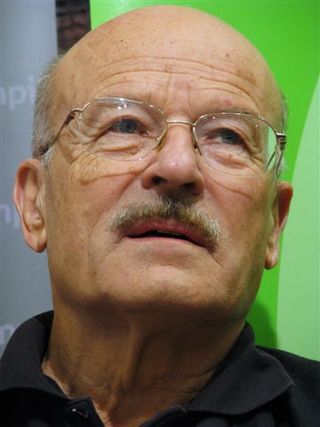
Volker Schlöndorff is a German film director, screenwriter and producer who has worked in Germany, France and the United States. He was a prominent member of the New German Cinema of the late 1960s and early 1970s.
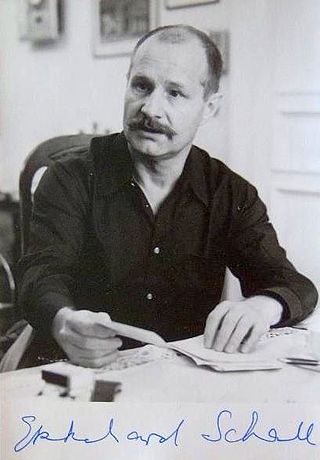
Ekkehard Schall was a German stage and screen actor/director.
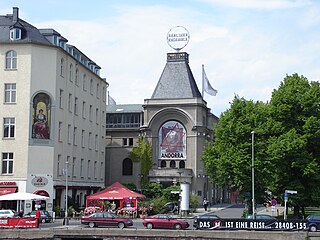
The Berliner Ensemble is a German theatre company established by actress Helene Weigel and her husband, playwright Bertolt Brecht, in January 1949 in East Berlin. In the time after Brecht's exile, the company first worked at Wolfgang Langhoff's Deutsches Theater and in 1954 moved to the Theater am Schiffbauerdamm, built in 1892, that was open for the 1928 premiere of The Threepenny Opera.

Bibiana Beglau is a German actress.

Benno Besson was a Swiss Theatre Director.

Katharina Thalbach is a German actress and stage director. She played theatre at the Berliner Ensemble and at the Volksbühne Berlin, and was actress in the film The Tin Drum. She worked as a theatre and opera director.
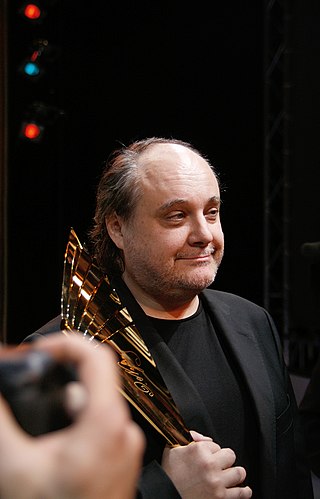
Paulus Manker is an Austrian film director and actor, as well as an author and screenplay writer.

The Lost Honour of Katharina Blum, or: How violence develops and where it can lead is a 1975 German political drama film based on Heinrich Böll's 1974 novel of the same name, adapted for the screen and directed by Volker Schlöndorff and Margarethe von Trotta. Schlöndorff and von Trotta wrote the script with an emphasis on the vindictive and harsh treatment of an innocent woman by the public, police, and media. The film stars Angela Winkler as Blum, Mario Adorf as Kommissar Beizmenne, Dieter Laser as Tötges, and Jürgen Prochnow as Ludwig. In 1984, the film and the novel were adapted into an American TV film, The Lost Honor of Kathryn Beck.
Peter Zadek was a German director of theatre, opera and film, a translator and a screenwriter. He is regarded as one of the greatest directors in German-speaking theater.

Therese Giehse, born Therese Gift, was a German actress. Born in Munich to German-Jewish parents, she first appeared on the stage in 1920. She became a major star on stage, in films, and in political cabaret. In the late 1920s through 1933, she was a leading actress at the Munich Kammerspiele.
Volker Spengler was a German stage and film actor. Spengler was best known to international audiences as a member of director Rainer Werner Fassbinder's acting ensemble, including his role as the transsexual Erwin/Elvira of Fassbinder's In a Year of 13 Moons (1978). Spengler appeared in about 40 film and television productions between 1966 and 2004, also working with other directors such as Christoph Schlingensief and Volker Schlöndorff. On stage, he performed at Berlin's Volksbühne and with the Berliner Ensemble.

Hunting Scenes from Bavaria is a 1969 West German film directed by Peter Fleischmann. It is based on a play of the same name by Martin Sperr, who also played the main role in the film. It was chosen as West Germany's official submission to the 42nd Academy Awards for Best Foreign Language Film, but did not manage to receive a nomination.

Angelika Hurwicz was a German actress and theatre director. She worked with Bertolt Brecht at his Berliner Ensemble company until 1958, when she moved to West Germany. Hurwicz was the first female director at the Burgtheater in 1978.
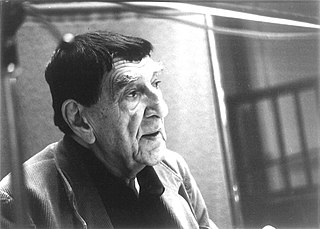
Wolf Kaiser was a German theatre and film actor. He grew up in Switzerland, where he studied chemistry and physiology. In 1937 he was deemed unfit for service in the Wehrmacht, and then went to Berlin where he trained as an actor.

Annett Renneberg (born 16 March 1978 in Rudolstadt) is a German actress and singer.

Jutta Lampe was a German actress on stage and in film. She was for 30 years a leading actress at the Schaubühne founded in Berlin by her husband Peter Stein, where she played both classical theatre such as Alkmene in Kleist's Amphitryon, and world premieres including Robert Wilson's Orlando for one actor, and roles that Botho Strauß created for her. She was also engaged at the Vienna Burgtheater and the Schauspielhaus Zürich. She appeared in more than twenty films from 1963, including lead roles in films by Margarethe von Trotta. Lampe was named Actress of the Year by Theater heute several times. Other awards included the Gertrud-Eysoldt-Ring and the Joana Maria Gorvin Prize for her life's work.

Peter Palitzsch was a German theatre director. He worked with Bertolt Brecht in his Berliner Ensemble from the beginning in 1949, and was in demand internationally as a representative of Brecht's ideas. He was a theatre manager at the Staatstheater Stuttgart and the Schauspiel Frankfurt. Many of his productions were invited to the Berliner Theatertreffen festival. He worked internationally from 1980.

Mutter Courage und ihre Kinder 1961 East German film produced by DEFA documenting the Berliner Ensemble staging of Bertolt Brecht's play of the same name. The play ran from 1959 to 1961, with Manfred Wekwerth and Peter Palitzsch directing, and stars Helene Weigel in the title role; it was modelled after the original 1949 production by Brecht and Erich Engel. The film received a prize at the Locarno Film Festival.
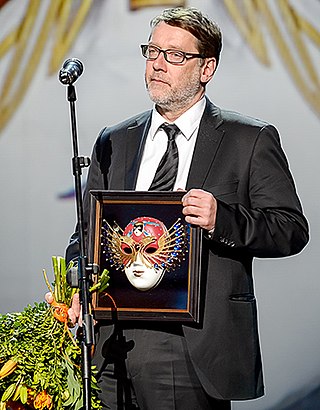
Michael Thalheimer is a German theatre director.

As part of an anti-communist campaign in Austria against the author Bertolt Brecht, his work was boycotted for ten years. Between 1953 and 1963, no established Viennese theater performed his works. The initiators were the publicists Hans Weigel and Friedrich Torberg as well as the Burgtheater director Ernst Haeussermann.



















